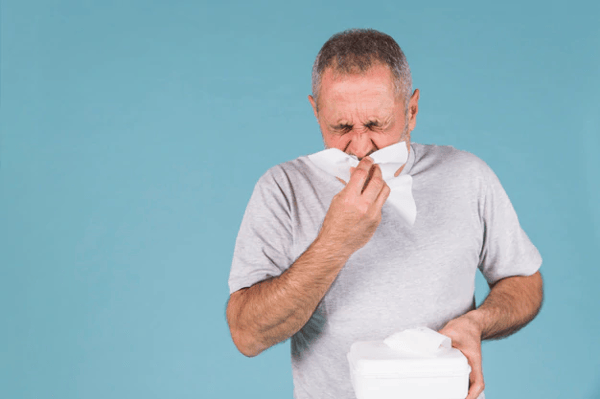Topics: Sleep Apnea, home sleep test
The winter is about to end; the sky is blue again, and everything is in bloom! It is the best time to take a stroll outside unless you have hay fever—allergic rhinitis that causes running nose, itchy eyes, and sneezing. In this article we will discuss in detail about the Hay fever symptoms and its effect on sleep.
Hay Fever
Hay fever is common in India when seasons change, especially just before the arrival of spring. It causes difficulty in breathing, sneezing, and might disrupt your sleep quality to a great extent. This is particularly bad news for patients suffering from obstructive sleep apnea.
So how to know if you have hay fever, and what are the measures you must take to prevent it? Here’s a look.
Hay Fever Symptoms
Hay fever also known as allergic rhinitis is an allergic reaction of your body with dust particles, animal hair, and the pollen in the air. And while that may keep your eyes itchy, and nose running all day long, these symptoms worsen during the night. Here are the common symptoms of Hay Fever:
- Sneezing: Frequent sneezing, especially in rapid succession.
- Runny or Blocked Nose: A clear, thin nasal discharge or nasal congestion.
- Itchy Eyes, Nose, Ears, and Mouth: An irritating sensation leading to scratching.
- Watery, Red Eyes: Often accompanied by swelling and itching.
- Postnasal Drip: The sensation of mucus moving down the back of the throat.
- Coughing: Triggered by excess mucus in the throat.
- Fatigue: General tiredness due to disrupted sleep and the body's reaction to allergens.
- Headache: Pressure headaches from sinus congestion.
.webp?width=600&height=399&name=hay-fever-symptoms-1%20(1).webp)
Why nose running? Because the allergens—dust particles, animal hair, and all—float in the air in the daytime but fall around to the ground as the temperature decreases in evenings. As a result, it increases the possibility of more exposure to allergens. And weakens your immune system.
Hay fever’s persistent symptoms can keep you awake throughout the night, and this may have catastrophic results, particularly for sleep apnea patients. As a result of poor sleep, you wake up tired the next day, there’s a lack of concentration, fatigue, and unwillingness to go about your daily routine.
Additionally, hay fever may collapse your upper airways during sleep—resulting in reduced airflow, a drop in oxygen levels, and interrupted rest times. This could also predispose people to obstructive sleep apnea.
How to Prevent from Hay Fever, pre?
Now the next question is how to deal with it? The best way is always prevention. So if you have the slightest inclination of falling sick with hay fever, take prescribed medications from your chemist.

For instance,
- Got congestion or a running nose? Ask your local pharmacy for some antihistamine night-time tablets or nasal spray. This will open up your nasal airways and allow you to breathe easier in bed
- Secondly, avoid excess exposure to the outside air. Keep your doors and windows shut as this may bring more pollen allergens and worsen your condition
- Third, take a good night’s rest, you might feel much better the next morning
But if despite the above, your symptoms continue to persist or worsen, consult your doctor.
Quality sleep is a basic requirement for your health and well-being. And while several of us often hamper our sleep schedule owing to professional or personal matters, it’s time we realize its importance. Spend time and efforts to work out what’s best for you, and take measures to avoid allergies or sickness that disrupt your sleep patterns. It will keep you healthy, and prepared to receive the glorious weather that spring is!
Afraid you may be dealing with a sleep disorder? Take the Home Sleep Test now.
FAQ's related to Hay Fever
Q. Does Hay Fever make you tired?
Ans. Yes, Hay Fever can cause fatigue due to symptoms like sneezing, congestion, and disrupted sleep, leading to tiredness.
Q. Why do I get Hayfever at night?
Ans. Hay fever symptoms can worsen at night due to cooler temperatures and increased indoor allergen exposure.
Q. How to prevent hay fever at night?
Ans. To prevent hay fever at night, keep windows closed, use air purifieres, shower before bed and if remain as it is then consult doctor.




